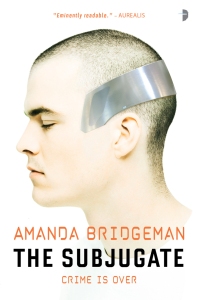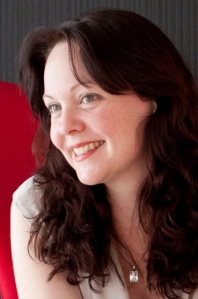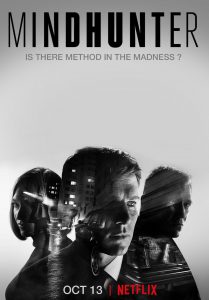Feature: Monsters Inc: The Dark Corners of Research
Amanda Bridgeman is an Aurealis Award finalist and author of 7 science fiction novels, including the best-selling space opera Aurora series and apocalyptic drama The Time of the Stripes. She […]
Amanda Bridgeman is an Aurealis Award finalist and author of 7 science fiction novels, including the best-selling space opera Aurora series and apocalyptic drama The Time of the Stripes. She […]
 Amanda Bridgeman is an Aurealis Award finalist and author of 7 science fiction novels, including the best-selling space opera Aurora series and apocalyptic drama The Time of the Stripes. She studied film & television/creative writing at Murdoch University, earning her a BA in Communication Studies. Perth has been her home ever since, aside from a nineteen-month stint in the UK where she dabbled in film & TV extras work. Her new novel The Subjugate is out now from Angry Robot and deals with a novel approach to treating serial killers…
Amanda Bridgeman is an Aurealis Award finalist and author of 7 science fiction novels, including the best-selling space opera Aurora series and apocalyptic drama The Time of the Stripes. She studied film & television/creative writing at Murdoch University, earning her a BA in Communication Studies. Perth has been her home ever since, aside from a nineteen-month stint in the UK where she dabbled in film & TV extras work. Her new novel The Subjugate is out now from Angry Robot and deals with a novel approach to treating serial killers…Charles Manson, Ted Bundy, Jeffrey Dahmer, John Wayne Gacy, Josef Fritzl, Aileen Wuornos… Serial Killers, murderers, monsters. We know their names just as well as we know the names of movie stars. The feelings for each are different, of course. We tend to admire the latter and abhor the former. But there is something about the former that many people find utterly fascinating. Their crimes are often so disturbing, we just can’t comprehend them no matter how hard we try.
Writing a story about a homicide detective in The Subjugate, I had to attempt to comprehend. I needed to understand the ‘why’. I needed to understand how these people come to do what they did. How they seemingly travelled so far from the ‘norm’ of an everyday human being. And writing aside, I’m one of those people who have always been fascinated by serial killers and murderers. Fascinated, and terrified. From a young age I found human beings to be the scariest monsters of all.
My earliest memory of a real ‘monster’, of a real ‘boogeyman’ was a person known as ‘The Geraldton Rapist.’ I was about eight or nine years old at the time and I remember my mother coming into my room at night to double-check the window was locked. I didn’t really know the details of it back then. I just remember there was a bad man, a monster, breaking into people’s homes and hurting them.
Fast forward a few years to my early/mid-teens and I made the mistake of watching a documentary that my older brothers were watching, called The Killing of America. This ‘shockumentary’ introduced me to the likes of Ted Bundy, Edmund Kemper, Charles Manson, the Jonestown Massacre, and many more cases, and it included a lot of disturbing real-life footage and interviews. I was left horrified, sickened and… also somewhat fascinated. It was a bit like a car accident. I knew I shouldn’t look, but I just couldn’t help it.
In my final year of high school, the Greenough Family Murders occurred – right on my hometown’s doorstep. It sent shockwaves through the community. Just a week or so before Karen MacKenzie and her children were brutally murdered, she visited my parents’ paint store and made a purchase. My mother remembers serving her. For many years afterward, whenever I drove to my hometown, I always searched for the ‘Greenough Murder’ house, which you could see from highway. News events like that are hard to forget.
 After high school I moved to Perth. In my final year of University, the Claremont Serial Killer began to terrorise the city. Sarah Spiers was the first of three young women to disappear, and to this day she’s never been found. I never knew her or her family personally, but her sister used to work at the grocery store where I shopped. I remember noticing her absence once, then days later seeing her on the news with her parents, in a story about Sarah’s disappearance. Every now and then over the years, I would think of Sarah, and hope upon hope that one day she would be found and her sister and parents could finally put her to rest. After 20+ years, a man has finally been arrested for these murders. One can only hope and the case goes to trial.
After high school I moved to Perth. In my final year of University, the Claremont Serial Killer began to terrorise the city. Sarah Spiers was the first of three young women to disappear, and to this day she’s never been found. I never knew her or her family personally, but her sister used to work at the grocery store where I shopped. I remember noticing her absence once, then days later seeing her on the news with her parents, in a story about Sarah’s disappearance. Every now and then over the years, I would think of Sarah, and hope upon hope that one day she would be found and her sister and parents could finally put her to rest. After 20+ years, a man has finally been arrested for these murders. One can only hope and the case goes to trial.
Australia has had its fair share of serial killers and infamous murder cases. If you mention Ivan Milat, Martin Bryant, the Snowtown murders, or Peter Falconio, most Aussies will know what you’re referring to. With the case of the disappearance of Peter Falconio, a man named Bradley John Murdoch was arrested and convicted of Peter’s murder despite his body never being found. It was only very recently that I discovered Murdoch had grown up in Northampton and Geraldton, and my father had known Murdoch’s parents. He said they were nice people.
The location of these headline-catching crimes may be close to home, but usually there is a safety barrier for most of us in that we don’t know either the victims or the killers. It’s something that happens to other people, not us, but still our interest is piqued. How did this happen in our town? How could someone do that? But when you find yourself just a few steps removed from key figures in a case, things can become even more fascinating/horrifying.
I had already finished writing The Subjugate when I decided to undertake further research on serial killers and infamous murderers. I had watched plenty of documentaries over the years and had recently binge-watched Mindhunter on Netflix, so I turned my attention to true crime podcasts. At first I picked out episodes on killers I had heard of, then I was so intrigued I went back and started listening to the entire back catalogues.
And I found this experience changed me. But not in a good way.
Utterly fascinated I was sometimes binging several episodes a day. And by the time I had made my way through the entire catalogue of one particular podcast, I’d noticed that my demeanour had changed. I was feeling flat, I was feeling blue. I wasn’t sleeping as well, and had become quite paranoid about personal safety. In short, I had depressed and scared the shit out of myself.
You see the podcast I was listening to really drew me in. To hear the cases told in a linear story-like format, in such detail, was very engaging. To hear interview extracts with some of the killers, some of the victims’ family and friends, some of the police who worked the cases, and to hear the in-depth backgrounds and childhoods of both the killers and victims, I became emotionally invested in the cases and hung on every word waiting to hear the endings. Sometimes the cops caught the killer, but far too many went unsolved. And those cases affected me the most.
One particular case I’d listened to, earlier this year, was that of the Golden State Serial Killer. I hadn’t heard of this case before listening to it, and it was such a lengthy case that it took 5 episodes to cover, running over 7 hours (generally it was one case per episode!). With each episode, I was thinking: They’re gonna catch this guy. They have to. Why would they dedicate 5 episodes to it if it had no ending? But I got to the end of the 5 episodes only to find that he’d never been caught.
I was devastated. This guy had raped 40+ women and killed several people across a 10+ year period, and he’d gotten away with it. It was gut-wrenching, and I couldn’t stop thinking about it. I felt so terrible for the families of the victims – that they may never see justice served, that they many never have answers, and for the cops who’d worked the case for years on end with no results.
 Then, literally two months after I’d listened to that podcast, they made an arrest! I can’t tell you how happy I was when I saw it on the news (I’m pretty sure I gave a fist pump). This case had been going since the 1970s and finally, FINALLY, they’d caught someone. Of course, it is still to be proven in court, but if the man they’ve arrested is found guilty, hopefully the families will get the answers they seek, the justice their loved ones deserve, and the cops can finally close the case and move on.
Then, literally two months after I’d listened to that podcast, they made an arrest! I can’t tell you how happy I was when I saw it on the news (I’m pretty sure I gave a fist pump). This case had been going since the 1970s and finally, FINALLY, they’d caught someone. Of course, it is still to be proven in court, but if the man they’ve arrested is found guilty, hopefully the families will get the answers they seek, the justice their loved ones deserve, and the cops can finally close the case and move on.
I mean, I was just listening to a podcast and I had been left so heartbroken, I could just imagine how the people living with the losses, living with the unsolvable cases would feel. And that’s something one of the podcasts delved into – how some of those left behind, were coping. Hint: some weren’t doing very well at all. It was so sad to see the ripple effect of these horrendous crimes. And don’t even start me on the cases that involved children. Cases like the Moors Murders horrified me beyond words. Those poor children… So my sympathy was sent into overdrive – and it burnt me out.
And it dawned on me then, once I’d realised my research had affected me not just emotionally but physically, that I needed to back away slowly from the podcasts and documentaries. I had to have some timeout from the monsters.
It was at this point I couldn’t help but recall the scene in the final episode of Mindhunter where [SPOILER] the serial killer Edmund Kemper hugs FBI agent Holden Ford and Ford breaks down in shock over the incident. Ford had grown too close to the killers, trying to understand them, in order to be able to catch others like them. I hadn’t grown close to the killers, but I had grown too close to the emotion of the victims, their families and the law enforcement officers. So, yes, for my own sanity, I had to ban myself from engaging in any podcasts or documentaries on killers for a while. To counteract things, I prescribed myself a dose of light comedies and pictures of cute kittens and puppy dogs. It worked!
Still, it’s a writer’s job to breathe life into characters and try to make them as realistic as possible. Listening to these podcasts and watching the documentaries, gave me a great insight into the backgrounds of killers, of what life is like for the victim’s family and friends, and also the tough time cops go through trying to deliver results for the families. It’s all great information that I will use in future books.
I’m now back to watching the occasional documentary (I just watched one the other day on the O.J. Simpson case), although I am still treading with caution. I don’t think the fascination will ever die. But I’m lucky. Unlike the families of victims, or the cops who work the cases, I only have to deal with these monsters in moderation. I can turn off and walk away whenever I like. They can’t.
I also get to write novels like The Subjugate, where my heroes fight crime and injustice and where I can control the outcomes. It may only be fiction, but it can be rather therapeutic and very rewarding.